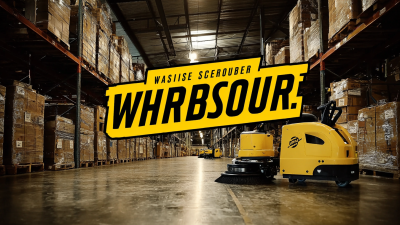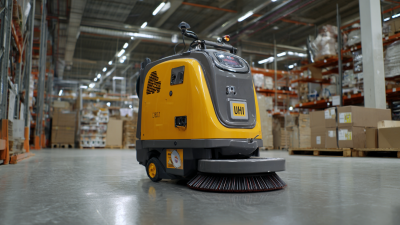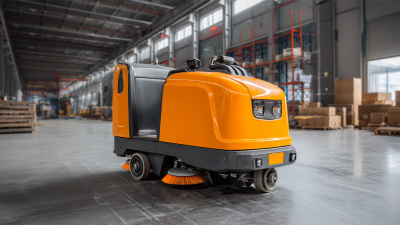Inquiry
Form loading...
Choosing the right Warehouse Floor Cleaner is critical for maintaining a safe and efficient working environment in industrial settings. According to a report by the International Floor Cleaners Association, improper cleaning methods can lead to increased slip and fall accidents, which account for roughly 25% of reported workplace injuries. Furthermore, an effective cleaning regimen can enhance the longevity of flooring materials, reducing replacement costs by up to 30% over time.

As warehouses face increasing operational demands and diverse cleaning challenges, understanding the key factors that influence floor cleaner selection becomes essential. This comprehensive guide aims to equip warehouse managers and facility operators with the knowledge needed to select the most effective cleaning solutions suited to their unique needs, ensuring both safety and efficiency in daily operations.
When selecting the best warehouse floor cleaner, several key factors must be considered to ensure effective cleaning while maintaining safety and cost efficiency. The size and type of your warehouse can significantly influence your choice. For instance, large-scale operations might require industrial-grade cleaners that meet rigorous health and safety standards, such as those outlined by the Occupational Safety and Health Administration (OSHA), which reports that slip and fall accidents in warehouses contribute to a notable percentage of workplace injuries.
One essential tip is to assess the material of your warehouse flooring. Different surfaces, such as concrete, tile, or epoxy, may require specific cleaning solutions to avoid damage and achieve optimal results. According to the Cleaning Industry Research Institute (CIRI), improper cleaning methods can diminish floor longevity by up to 30%. Therefore, selecting a cleaner suited for your floor type can enhance maintenance while reducing replacement costs.
Another critical factor is the environmental impact of your cleaning products. Eco-friendly cleaners not only comply with local regulations but also contribute to a healthier workplace. A report from the Environmental Protection Agency (EPA) indicates that adopting green cleaning practices can reduce indoor air pollutants by up to 50%, promoting a safer environment for employees. Always opt for certified green products when possible to prioritize both cleanliness and sustainability.
| Factor | Description | Importance | Example Products |
|---|---|---|---|
| Type of Cleaning Solution | Consider if you need a degreaser, disinfectant, or general cleaner. | High | Industrial Degreasers, PH-Neutral Cleaners |
| Floor Material Compatibility | Ensure the cleaner is suitable for concrete, tile, or other surfaces. | High | Concrete Cleaners, Tile Cleaners |
| Safety and Environmental Impact | Look for eco-friendly options and safety certifications. | Medium | Green Seal Certified Cleaners |
| Ease of Use | Consider concentration levels and dilution requirements. | High | Ready-to-Use Cleaners, Concentrated Formulas |
| Cost Effectiveness | Analyze price per square foot cleaned or yield of the product. | Medium | Bulk Purchase Options, Value Packs |
When choosing the best warehouse floor cleaner, understanding the compatibility between the cleaning solution and the floor material is crucial. Different floor types, such as concrete, tile, or epoxy, each have unique properties that dictate the appropriate cleaning methods. For instance, using a heavy-duty cleaner on polished concrete can lead to damage, while a gentle solution may not effectively remove stubborn stains. Assessing floor material compatibility ensures that the cleaning agent maintains the integrity and appearance of the flooring.
Tips:
When selecting a warehouse floor cleaner, it's essential to prioritize eco-friendly options that are effective yet safe for both the environment and your workforce. One of the best choices in this category includes biodegradable cleaners, which break down naturally without leaving harmful residues. These cleaners often utilize plant-based ingredients, ensuring a thorough clean while minimizing environmental impact. For instance, citrus-based cleaners not only boast powerful grease-cutting abilities but also emit pleasant, natural scents during use.
Additionally, consider using non-toxic and phosphate-free cleaners to reduce water pollution and promote healthier air quality within the warehouse. Such cleaners often come in concentrated forms, allowing for dilution according to specific cleaning needs, which can lead to reduced packaging waste. Moreover, employing steam cleaning as a method can effectively sanitize floors without the need for harsh chemicals, making it an excellent eco-friendly option. By choosing these sustainable products, businesses can maintain cleanliness and safety while demonstrating commitment to environmental stewardship.

When selecting the best warehouse floor cleaner, it's crucial to understand the different cleaning methods available and their effectiveness. Traditional mopping, while still common, often fails to deliver a deep clean, especially in high-traffic areas. A specialized floor scrubber can be more efficient, utilizing mechanical scrubbing action and a combination of water and cleaning solutions to remove dirt and grime effectively. This method not only cleans but also sanitizes the floor, making it ideal for warehouses that handle food or medical supplies.
Another important cleaning method to consider is the use of high-pressure washing. This technique is particularly effective for outdoor warehouse facilities and can tackle tough stains like oil or grease. High-pressure washers can blast away contaminants without the need for harsh chemicals, making them an eco-friendlier option. Moreover, steam cleaning is gaining popularity among environmentally-conscious warehouses, as it uses high-temperature steam to eliminate bacteria and dirt while requiring minimal water and no added chemicals. Each method has its own merits, and understanding them can help warehouse managers choose the most effective cleaner for their specific needs.
When selecting the best warehouse floor cleaner, evaluating cost versus performance is essential. Businesses often face the dilemma of opting for budget-friendly options that may compromise on cleaning effectiveness or investing in higher-priced products that ensure superior results. To strike the right balance, it's crucial to analyze your specific cleaning needs, the size of the area to be cleaned, and the types of contaminants involved.
One tip is to conduct a performance assessment of various cleaners within your budget. Consider ordering samples or smaller quantities for trial cleaning sessions to determine how well each product addresses the grime and stains typical in your warehouse environment. Additionally, keep in mind that some cleaners are more concentrated than others, which can impact overall cost-effectiveness.
Another tip is to prioritize features that enhance performance. Look for cleaners with fast-drying capabilities and those that are safe for various surfaces. These attributes not only improve operational efficiency but also reduce downtime, saving money in the long run. By carefully weighing these elements, you can make an informed decision that meets both budgetary constraints and cleaning effectiveness in your warehouse space.







